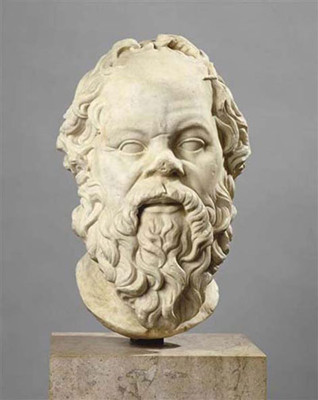
One day, an acquaintance met Socrates and said, "Do you know what I just heard about your friend?"
дёҖеӨ©пјҢиӢҸж јжӢүеә•йҒҮеҲ°дёҖдҪҚзҶҹдәәпјҢзҶҹдәәй—®пјҡ“дҪ зҹҘйҒ“жҲ‘еҲҡеҲҡеҗ¬иҜҙдҪ жңӢеҸӢеҸ‘з”ҹд»Җд№ҲдәӢжғ…дәҶеҗ—пјҹ”
"Hold on a minute," Socrates replied. "Before you talk to me about my friend, it might be a good idea to take a moment and filter what you're going to say. That's why I call it the triple-filter test. The first filter is Truth. Have you made absolutely sure that what you are about to tell me is true?"
“зӯүзӯүпјҢ”иӢҸж јжӢүеә•зӯ”йҒ“гҖӮ“еңЁдҪ иҜҙеҮәжҲ‘жңӢеҸӢзҡ„дәӢд№ӢеүҚпјҢдҪ•дёҚзЁҚзӯүзүҮеҲ»пјҢи®©жҲ‘еҜ№дҪ жғіиҜҙзҡ„еҶ…е®№иҝӣиЎҢиҝҮж»ӨгҖӮжҲ‘жҠҠе®ғеҸ«еҒҡ‘дёүйҮҚзӯӣйҖүжөӢиҜ•’гҖӮ第дёҖйҮҚж»ӨзҪ‘жҳҜ‘зңҹзӣё’гҖӮдҪ иғҪзҷҫеҲҶд№ӢзҷҫзЎ®е®ҡдҪ зҡ„ж¶ҲжҒҜжҳҜзңҹдәӢеҗ—пјҹ”
"Well, no," the man said, "actually I just heard about it and..."
“е‘ғпјҢдёҚиғҪпјҢ”йӮЈдәәиҜҙпјҢ“е…¶е®һжҲ‘д№ҹжҳҜеҲҡеҗ¬дәәиҜҙзҡ„……”
"All right," said Socrates. "So you don't really know if it's true or not. Now, let's try the second filter, the filter of Goodness. Is what you are about to tell me about my friend something good?"
“еҘҪзҡ„пјҢ”иӢҸж јжӢүеә•иҜҙгҖӮ“жүҖд»ҘдҪ 并дёҚжё…жҘҡдәӢжғ…зҡ„зңҹдјӘгҖӮзҺ°еңЁпјҢжҲ‘们жқҘиҝӣиЎҢ第дәҢж¬ЎзӯӣйҖү——‘е–„ж„Ҹ’гҖӮдҪ иҰҒе‘ҠиҜүжҲ‘зҡ„жҳҜжңүе…іжҲ‘жңӢеҸӢзҡ„еҘҪдәӢеҗ—пјҹ”
"No, on the contrary..."
“дёҚпјҢжҒ°жҒ°зӣёеҸҚ……”
"So," Socrates continued, "you want to tell me something bad about my friend, but you're not certain it's true. You may still pass the test though, because there's one filter left—the filter of Usefulness. Is what you want to tell me about my friend going to be useful to me?"
“йӮЈд№ҲпјҢ”иӢҸж јжӢүеә•жҺҘзқҖиҜҙпјҢ“дҪ жү“з®—е‘ҠиҜүжҲ‘дёҖ件关дәҺжҲ‘жңӢеҸӢзҡ„еқҸдәӢпјҢдҪҶдҪ еҸҲдёҚзЎ®е®ҡе…¶зңҹдјӘгҖӮдёҚиҝҮдҪ дҫқ然жңүеҸҜиғҪйҖҡиҝҮжөӢиҜ•пјҢеӣ дёәиҝҳжңүдёҖйҮҚж»ӨзҪ‘——‘е®һз”Ё’гҖӮиҝҷ件关дәҺжҲ‘жңӢеҸӢзҡ„дәӢеҜ№жҲ‘жңүз”Ёеҗ—пјҹ”
"No, not really."
“дёҚпјҢжІЎд»Җд№Ҳз”ЁгҖӮ”
"Well," concluded Socrates, "if what you want to tell me is neither true, nor good, nor even useful, why tell it to me at all?"
“еҘҪеҗ§пјҢ”иӢҸж јжӢүеә•жҖ»з»“йҒ“пјҢ“еҰӮжһңдҪ иҰҒе‘ҠиҜүжҲ‘зҡ„дәӢжғ…ж—ўдёҚжҳҜзңҹзҡ„пјҢеҸҲдёҚжҳҜеҘҪдәӢпјҢз”ҡиҮіжҜ«ж— з”ЁеӨ„пјҢйӮЈдҪ еҸҲдҪ•еҝ…е‘ҠиҜүжҲ‘е‘ўпјҹ












